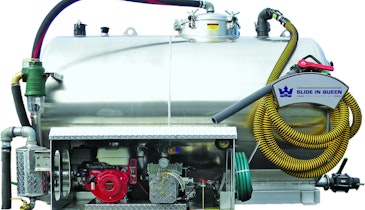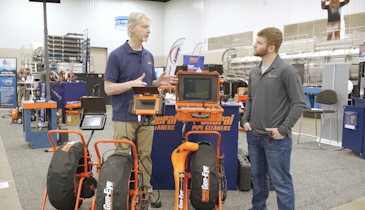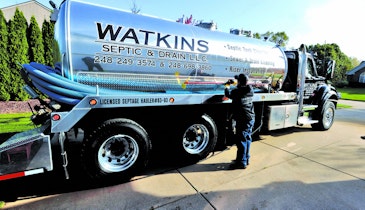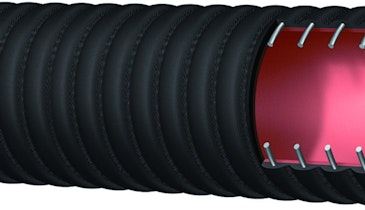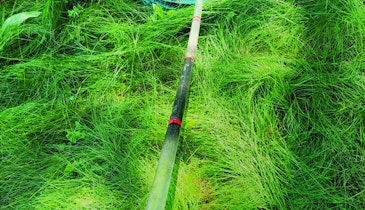A new Iowa law that took effect in July requires systems to be inspected, pumped, and brought up to modern standards when real estate changes hands. And the state’s Department of Natural Resources has begun cracking down on old systems that dump untreated household wastewater into open ditches, bedrock or waterways.
According to DNR estimates, as many as 100,000 rural homes in Iowa still use systems that do not adequately treat household sewage.
The Iowa Onsite Waste Water Association is the statewide association for the septic industry, with about 400 members, including pumpers, regulators, installation and maintenance contractors, soil scientists, engineers, manufacturers and educators. George Dickerson is treasurer and immediate past president of the association, holding the top job as the new regulations were drawn up and implemented. He also owns Dickerson Mechanical, which provides septic system installation, pumping, maintenance and repair.
Dickerson spoke with Pumper about how the new regulations are raising standards for the industry and how regulators and pumpers are learning to work together.
Pumper:
Tell us about your experiences with the DNR’s tougher enforcement of standards for septic systems and requiring property owners to take out old systems.
Dickerson:
My firm helped with a job in Mount Carmel, Iowa, a little town that had about 40 systems that actually dumped out into a farmer’s field. The DNR caught it about 11 years ago and last year said, “OK, folks, we’re done with you, and you’re going to figure it out.” They couldn’t figure out how to build a lagoon there to have a sanitary sewer system, so we built individual septic sites.
We’re seeing sanitarians in all of the counties where we work become a lot more strict about our state code, Chapter 69. We’re actually seeing the sanitarians become a little better educated. They’re learning more about the soils and they’re actually following up on calls (reporting sewer odors), and finding quite a few systems discharging into ditches.
Pumper:
Is this crackdown better for the septic and pumping industry?
Dickerson:
Absolutely. I think it’s something that had to happen. You have to be licensed now in Iowa to pump, and I’m very pleased that the DNR followed through with that. It made those guys become a lot more accountable. Prices went up for pumping and some (customers) are complaining; I tell them, “The good Lord’s not making any more ground.” We need to protect our environment. I haven’t had any trouble, but it’s been a hard thing for the pumpers because they’ve really had to raise their prices to be able to dump all the sewage at waste treatment plants. (The regulation) gives us some tools to educate the homeowner. It gives tools for the installers to be a lot more professional.
Pumper:
Do you think these developments could lead communities or individuals to back away from onsite treatment and instead go for larger sewer system infrastructures?
Dickerson:
I think the onsite part of it is just going to keep growing and growing. In the last five years it’s changed dramatically, because some of these inspectors and some of the rules force you to go to an advanced system, to a peat filter or a sand filter or (other) treatment systems. It’s not all just about going in and putting in a regular system. You have to be a professional, you have to keep up, and I think that word is finally getting out.
Pumper:
In these matters, what kind of education has IOWWA been doing?
Dickerson:
IOWWA offers a certified installer program. It’s been working very well; six counties have already jumped on board. We’re trying to do that through NEHA (National Environmental Health Association) so we have a national testing. IOWWA also is requiring continuing education.
Pumper:
How have things been working between your organization and the state DNR? Have you been able to work together? Do you feel they understand you and vice versa?
Dickerson:
It’s a great communication line. At our 2008 conference, the DNR regulators were there and the Public Health Department regulators were there. The communication lines are open and they’re wonderful.
Pumper:
What kinds of problems have there been and how have you resolved them?
Dickerson:
One of the biggest issues on Chapter 69 is soil separation. Everything needs soil analysis now. It’s not mandatory yet but leading that way. Percolation tests are going by the wayside. As a contractor and as an installer, and having been on the IOWWA board, we have to keep learning about soils, because if we’re going to keep doing those residential systems, we want them to last 50 years.
Also, it’s really hard to clarify the interpretation of all these new laws. Even the smaller guys that are installing are starting to ask more questions. The DNR has just been wonderful about answering all those questions.
Pumper:
You mentioned before that sanitarians seem to be improving their knowledge. How has that come about?
Dickerson:
The sanitarians have their own conference each year. Because a lot of sanitarians come to the IOWWA conference — maybe 50 percent of them now in the state — we should interact back on their side (and get) a better understanding why some of their rules are coming down the line.
We have sanitarians that (see a septic repair situation) and they’ll say, “Oh gosh, you’ve got to do this $14,000 sand filter.” And I go out and dig up the soil and tell them, “This can be an at-grade, pressurized dose system” — an alternative that’s maybe only $7,500. So I’m trying to interact with them.
Let’s be able to talk to each other and not hold grudges that go on to the next system. We are communicating much better, and I think IOWWA was influential in helping sanitarians get some more training, too.
Pumper:
How should pumpers respond when, as in Iowa, more intensive regulation comes to their state?
Dickerson:
They need to fill out the paperwork and comply. The intent of all this wasn’t to put pumpers out of business. A few pumpers are going to end up getting themselves in trouble because they still haven’t complied. My other advice is, once they comply, do their paperwork. I work with some wonderful pumpers (as subcontractors). But I ask them, “Are you filling out all your paperwork? Because I don’t want you or me to get in trouble. I want it to be taken to the proper place to be dumped.”
Pumper:
Do you see this as actually helping to increase business? It sounds like there’s going to need to be, over time, a lot of new, additional installations.
Dickerson:
The time-of-transfer (inspections and upgrades) are going to increase everybody’s business. It’s going to take a lot of quality people from the beginning to the end. It’s going to take pumpers that are professionals and installers that are professionals. We’re going to be installing these systems; we’re going to have to have pumpers that are responsible.
Pumper:
So what’s the bottom line response to enhanced regulation?
Dickerson:
I think we’re making great progress. A lot of my friends in the same business call me repeatedly and say, “I don't want any of this to happen. I don’t want any licensing, I don’t want any certification, I don’t want any inspections.” Well, George Dickerson’s response is, “If you are a professional and you’re doing these things right, don’t worry about any of those things. They’ll fall in place just right for you.”
